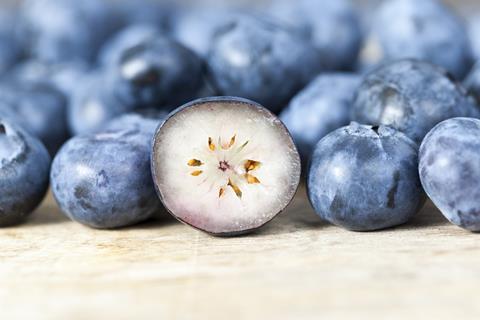USHBC-funded research indicates support of potential for blueberry consumption to help middle-aged individuals against cognitive decline
A new research study published in Nutrients has found that blueberries have cognitive benefits.

More specifically, the equivalent of a half-cup of fresh blueberries per day, consumed as freeze-dried blueberry powder, was found to help middle-aged individuals against cognitive decline when implemented early in at-risk individuals.
According to the US Highbush Blueberry Council (USHBC), which supported funding for the research, this is an important finding given that in the US, nearly 6m older adults live with dementia.
Since limited treatments for cognitive decline exist, preventative approaches and mitigation of risk through proper nutrition are of increasing importance.
Given that neurodegenerative changes associated with cognitive decline start in midlife, this research indicated that blueberries could present an opportunity for early intervention, by targeting modifiable risks like poor nutrition and related metabolic disturbance.
Trial details
The randomised, double-blind, placebo-controlled trial, ’Blueberry Supplementation in Midlife for Dementia Risk Reduction’, looked at the impact of blueberry supplementation to produce measurable cognitive benefits in the context of ageing and insulin resistance.
Participants (n = 27) were overweight (BMI > 25) men and women 50 to 65 years old with subjective cognitive decline and moderate insulin resistance.
Over the course of 12 weeks, participants were randomly assigned to consume either freeze-dried blueberry powder or placebo powder daily.
Participants were asked to consume the powder with either their morning or evening meal, mixing it with water. Pre-and post-intervention assessments of cognition and metabolism and exploratory measures of peripheral mitochondrial function were conducted.
Improved performance
The blueberry group experienced improved performances on measures of lexical access, such as letter fluency as measured by the Controlled Word Association task, improved performances on measures of memory interference, such as fewer recall intrusion errors as measured by the California Verbal Learning Test and reduced memory eroding difficulty in daily life activities, such as reduction of forgetfulness, as measured by the Everyday Memory Questionnaire.
The blueberry group also experienced correction of peripheral hyperinsulinemia, which is associated with neurodegeneration in the brain, as well as a significant decline in fasting insulin levels.
Based on these findings, the study authors suggested that the potential mechanisms for these findings could be associated with anthocyanins and proanthocyanidins, the bioactive flavonoid compounds found in blueberries responsible for their vibrant blue colour.
Importantly, these report that blueberries may induce metabolic and other benefits that could serve as an early intervention for preventing the cognitive decline associated with ageing.
“This is the first study of its kind to look at blueberry supplementation in middle-aged individuals at risk for future health problems and late-life dementia,” said Robert Krikorian, PhD, Department of Psychiatry and Behavioral Neuroscience, University of Cincinnati Academic Health Center and the study’s lead investigator.
“Importantly, this research provides evidence that blueberry supplementation can improve cognitive function and correct high insulin levels in these participants with prediabetes.”
Supporting previous research
The study builds on previous research in this area, which has demonstrated improvement in long-term memory performance with blueberry supplementation in older adults with mild cognitive impairment.
It also supports previous research that found an association between blueberry consumption and improved metabolic function in at risk individuals, such as an improvement in insulin sensitivity.
USHBC said that further research was needed to look at blueberry supplementation over a longer time period, with a more robust sample size.
Additionally, longitudinal cognitive assessments would be of value to assess the influence of blueberries on the progression of cognitive decline and to more thoroughly investigate the mechanisms of neurocognitive benefit.
“While further studies are warranted, our results provide novel and exciting data regarding the potential of blueberry supplementation as a preventive intervention,” Krikorian added.






